Extract from The Guardian
As an Oscar-winning actor, she could emasculate her leading men. As a Labour MP, she skewered her leader, Tony Blair. After her acclaimed King Lear, is she back to command the theatre world again?Glenda Jackson: ‘I don’t think of myself as an idealist.’ Photograph: Sarah Lee for the Guardian
Simon Hattenstone
Thursday 15 December 2016 05.41 AEDT
Glenda Jackson is small and slight, her face crumpled like an old £5 note. She looks out of place amid the glitz of London’s Langham hotel – she smokes and swears like a trooper and, at 80, she is as single-minded as ever.
Jackson has always been her own woman. Who else would walk out on Hollywood in her prime to become a backbench member of parliament? And who else would stick at it for 23 years, grafting away to little notable effect (apart from making a stonking enemy of Tony Blair)? And who else would choose to celebrate her ninth decade by returning to the stage as raging King Lear, Shakespeare’s most gruelling part?
“I couldn’t make up my mind whether it was arrogance or just insanity,” she says. She looks around the salubrious tea rooms, marvelling at the decor in a manner that suggests she is not wholly enamoured. You imagine she would be happier in a greasy spoon.
Jackson even does publicity her own way. A few months ago, soon after it was announced that she would return to the stage for the first time in 25 years to play Lear, I saw her outside Blackheath station in south London trying to convince people to stay in the EU. I told her I would love to interview her for Lear. Fine, she said, before deciding it was best to wait till the show was done and dusted. So only now, two months after critics unanimously acclaimed her Lear, and a couple of weeks after the run finished, is she ready to promote it. “The curious thing is that it was like I’d never been away. People said to me: ‘Oh, you’ll be fine, it’s like riding a bike,’ and I said: ‘Don’t be ri-dic-ulous, it’s rather more complicated than riding a bike.’” Her “ridiculous” is delivered with such force it could cause whiplash.
“But, you know, I’d seen my friend Nuria Espert do it in Spain and she said: ‘Why don’t you do it?’ and I said: ‘Don’t be ri-dic-ulous.’” More whiplash. “What, a woman playing Lear, been away for 25 years? Don’t be ab-surd. Then other people said to me: ‘If you’re going to come back, come back with something,’ you know … So I said I’ll either crash and burn or whatever.”
King Lear review – Glenda Jackson makes a triumphant return to the stage
Jackson ends a 25-year absence with a
ferocious, unflinching performance that transcends gender and puts
her among the best Lears
Read more
It’s no surprise that she whatevered. Jackson was always a magnificent actor, whether on stage or screen. She was a regular at the Oscars before the Academy had even heard of Judi Dench (winning for Women in Love and A Touch of Class in 1971 and 1974 respectively). Her notable portrayal of Queen Elizabeth I on TV in 1971 also beat Dench’s effort by several decades. She was beautiful (all bobbed hair, high cheekbones and flushed lips), with astonishing diction and an unfeasible capacity for depicting cruelty. Nobody did scorn quite like Jackson. She could emasculate a leading man from 100 paces. And yet there was so much more to her than the icy temptress.
One of my favourite performances is in a small 70s film called Stevie about the poet Stevie Smith. The complexity of Smith’s character allows Jackson to display a formidable range (social butterfly, depressive introvert, arrogant egotist, suffocating spinster, adoring niece, disdainful lover), often all in the one scene. Smith’s ambiguities mirror some of the ambiguities in Jackson herself. Often the actor appeared bohemian (starring in so many of those louche Ken Russell films that she became known as “the first lady of the flesh”), but in fact there has always been something of the puritan about her.
When I mention Stevie, her face lights up. “Oh well, she was marvellous, wasn’t she? I met her, you know. It was when I was with the RSC and they had this programme doing a mixture of poetry and jazz on Sunday evenings. I’d been roped into doing one, and I was standing in the wings waiting to go on and do my stuff, and this little woman comes up to me. I’d never seen her in my life – short, with a fringe, hair below her ears, wearing a white blouse, a dark jumper, lisle stockings, a dirndl skirt …”
Blimey, I say, how can you remember all this?
“Because she was so amazing. Let me finish my story … which looked as though she’d woven it at home, ankle socks, sandals and a very good piece of Victorian jewellery at the neck of her blouse. And the thing that was amazing to me was that there wasn’t a single protective curve anywhere in her body. She said: ‘I’m Stevie Smith.’ I said: ‘Oh, hello,’ never having heard her name in my life before, and she goes on to the stage and does Not Waving But Drowning, and I think: ‘Who the fuck are you?’ And I dashed out to the bookshops the next day and there wasn’t a single one of her books in print. Years later, she became quite famous and she absolutely loved it and milked it for all it was worth, for which I take my hat off to her.”
Jackson is transformed as she talks. She has a wonderful facility with language – this could have been a monologue scripted by Alan Bennett. Jackson had a very different attitude towards fame – it was the price of success. As for her own protective curves: “I have lots. I turn my feet in when I’m sitting down. I tend to put my arms across me when I’m sat thinking, I bend forwards. Loads of protective curves.”
As Gudrud Brangwen in Women in Love
(1969). Photograph: Everett/Rex/Shutterstock
Is Stevie one of her favourite pieces
of work? “I don’t really have favourites,” she says, brusquely.
Come off it, I say – you must be able to think of films you’ve
loved and hated? “Oh, I could certainly do that,” she says.
Go on then.“No, I’m not going to. I’m sitting here as a woman who, over 80 years, has had to learn how to be diplomatic.” You can’t go around saying just what you want to whom you want in politics, she says – least of all to your constituents.
Blimey, I say, disappointed. I never thought diplomacy was your bag. “I don’t think it is. I mean, I’m perfectly prepared to say the horrible things I did which easily spring to mind. Bequest to the Nation, where I played Emma Hamilton, I’m just ghastly in. And I did a film about Sarah Bernhardt, I’m lousy in that.” Why were you so bad?” Because I didn’t believe in it, or because I couldn’t convince myself of its reality in some way.”
Interviewers have often said Jackson is scary – over the years they have called her cold, aloof, charmless, humourless. Does it upset her? “I’ve never understood the fear thing.” Perhaps it’s the front you project, I say. She asks what I mean. Well, I say, you can be pretty abrupt – at Blackheath station, she shouted out after me that I was a “patronising git” …
She laughs. “Oh, I see, yeah! It’s the north versus the south. It’s what we do in the north!” When you’re working in a team producing something creative, you have to be prepared to be honest to get the best results, she says. “I expect people to say to me: ‘What the fuck d’you think you’re doing?’ Not that I would ever say that to anybody, but that’s what you’re looking for; there is that shared sense of responsibility.”
Jackson was born in Birkenhead to working-class parents – her father was a bricklayer, her mother a cleaner. She left school at 15 and worked at Boots. Jackson was ambitious, determined to get a transfer from the medical counter to cosmetics. She didn’t wangle that one, but she did end up at the Royal Academy of Dramatic Art.
You sense her politics – traditional Labour, solidarity, feminism – was shaped by family and relationships. Jackson has said in the past that she has never been involved in a nonviolent relationship. She has one son, the political columnist Dan Hodges, from her marriage to Roy Hodges, whom she divorced in 1976. She has been happily single for decades, and lives in the basement of Dan’s home with his family.
On the campaign trail with Gordon Brown
in 2010. Photograph: Andrew Winning/PA Archive/PA Images
When she went into politics, she was expected to bring glamour to
the Labour
party. Jackson did anything but. She did not wear makeup or play the
celebrity, and settled down to the nitty-gritty of life as a
constituency MP.What took her into politics? “Anything I could have done that was legal to get Margaret Thatcher’s government out I was prepared to do. I could not believe what she was doing to this country.”
Was it anger or idealism that drove her? “No, I didn’t think of myself as an idealist. I consider myself as a believer in what I regard as the Labour party’s basic principles, which have to do with equality and ‘do unto others as you would have them do unto you’. You know, the golden rules.”
The word Jackson returns to again and again is transformative – whether about the arts or politics. “My life was transformed by the Labour government of 1945. It was transformative for millions of people like me, you know – education, the health service. It was proof that politics can make life better for people; that a social dream can become a social reality by the power of government.”
Does she understand why people are so cynical about politicians now? “Yes. For so long that voice of people on the doorstep was ignored in this country, not just by one political party, but by all of them.” There is little to be positive about in the immediate future, she says, with Trump in the US and Brexit here. “I still believe that we can come together, that there are values we do all share, but the journey to that is going to be bumpy. It’s not just like opening the door and saying: ‘Oh don’t deliver the milk tomorrow.’ It’s going to be bloody difficult.”
How does she think Labour leader Jeremy Corbyn is doing? “You tell me,” she shoots back. “How low are we in the polls?” Would she define herself as a Corbyn supporter in any way? “Yes, as a person. We had contingent constituencies. I found him marvellous to work with, always cheerful, used to talk to everybody, wrote me a very sweet letter when I didn’t stand at the last election. I wrote back to him saying my only regret was that, as I was no longer a member of parliament, I could not nominate him for the leadership, which I would have done, because I was a firm believer that we always had to have a left-of-centre candidate. Never in a million years would I have voted for him, though.”
Even though Jackson never achieved high rank, she was a fearless politician. She will be remembered for skewering Iain Duncan-Smith on welfare reform, damning Thatcher’s legacy in the Commons just after she died and, most of all, her sustained attack on her own leader and prime minister, Tony Blair, after the Iraq war. She said he “suffered from the insolence of office” (a quote from Hamlet), called for his resignation and even considered standing against him as a stalking horse. That didn’t do much for your prospects, did it? “Well, I couldn’t have done anything else, because of my consistent opposition to the Iraq war.”
How did he treat you after that? “No different to the way he treated me before, because we’d hardly ever met.” What? But you’re Glenda Jackson? “That didn’t make any difference in parliament.” He wasn’t interested in you? “Well, what was there to be interested in? What they were interested in was how often were you prepared to open your mouth and say this is the wrong thing to do, and I was prepared to open my mouth at the drop a hat to say this was the wrong thing to do. But as a backbench MP you don’t see them.”
‘I was prepared to open my mouth at the drop of a hat to say what was wrong.’ Photograph: Sarah Lee for the Guardian
Jackson was criticised for her poor attendance in parliament. Was that valid? “Oh yes, absolutely.” What’s her excuse? “I don’t have one. I don’t think I ever missed a three-line whip, but to hang about for a one- or two-line whip on something of utter irrelevance, I couldn’t understand the point of it. If I could have been doing something in the constituency, that was obviously the priority.”
Following boundary changes that broke up her old Hampstead and Highgate seat, Jackson won Hampstead and Kilburn with the country’s second-smallest majority (42 votes) in 2010 and stood down in 2015. In the end, did politics live up to her expectations? “Oh, no. No.” In what way? “Well, I think we all love The West Wing because that’s the way we wish politics was, but it isn’t. But equally I wouldn’t have missed it for the world. I don’t know that politics itself disappointed me. But the structures of politics did, certainly. The minute you’re elected, you’re responsible for your constituency; I had no office, I had no staff, I had no equipment. It was six months before I had an office, which I shared with somebody. And one of the big changes has been in the hours the House sat. I mean, it was absolutely de rigueur that you would go to work at 9am and still be there at three the following morning, for no good reason. I mean, ut-ter-ly ridiculous. They only starting sitting at two in the afternoon, even though you started work at nine, so those changes have come in, which I think are very valid. But I think there’s still far too much antiquated discipline.”
Did you miss acting? “No, but I certainly missed the people. I missed them very much; it’s a very different kind of person. I missed the humour, I missed the generosity, I missed the kind of acceptance that just takes people for what they are.” She also missed the camaraderie.
I ask if anything in acting can beat taking on Blair in the Commons or helping a constituent in dire need. No, she says, she’s not playing that game. “They are not analogous. They are entirely different.” But a second later she isn’t so sure. “They’re not entirely different …”
I interrupt. “No, let me dig my way into trying to answer your question.” And she really does go into battle with herself. “The exclusive responsibility for arguing against the Iraq war or stating my opinion of Margaret Thatcher’s regime was mine … If there was a fallout, it was mine. The responsibility in acting is not exclusively mine. There’s a shared responsibility.”
I’m not talking about shared responsibility, I say.
“Well, I am!” she snaps in her best scouse.
What I’m talking about is what gave you the most satisfaction; the biggest high. “No, no, that’s not how it works! There isn’t a high. And if there is a high, it’s – what’s that thing they say about enjoying something in …”
Retrospect?
As Lear with Rhys Ifans as the fool in King Lear in November. Photograph: Tristram Kenton for the Guardian
“Thank you. Yes, they are retrospective. But the moment is passed. And it’s being in the now that counts.”
She talks about how she’s fitter than she has been in years, thanks to Lear. She went swimming, walking, even cut down on the fags in preparation. “Since doing Lear I’m down to under 10 a day, except for my indulgence day – which was Sunday, when I allowed myself a couple more.”
Is this the start of the second half of her acting career? “The other stuff that has been sent to me doesn’t interest me, so we’ll wait and see.” She is in discussions about transferring Lear to New York. Are there enough roles around for her? “Oh God, no. That is one of the really shocking things that hasn’t changed in my 25 years of being out of it. Creative writers still don’t find women interesting. They are hardly ever the dramatic engine, they are mostly an adjunct, and I find that very bizarre.”
I tell her she never answered me about which career gave her most satisfaction. She can’t, she says. OK, then, I say; if your parents were still around, what do you think they would have been proudest of? “Probably neither,” she says instantly. “I think my father was probably proudest of the honorary doctorates I got, and for my mother it would be that I went home with no holes in my shoes. They would be the things, yes.”
Glenda Jackson and the Making of King Lear is on BBC Radio 4 on Christmas Day.
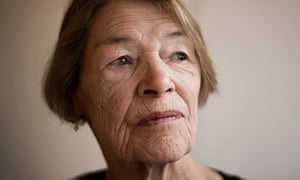
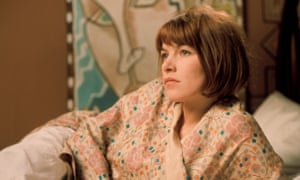
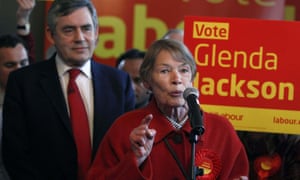
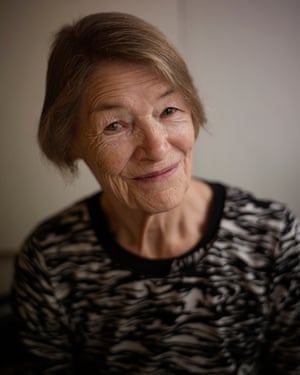
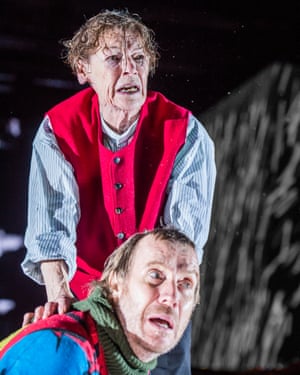
No comments:
Post a Comment